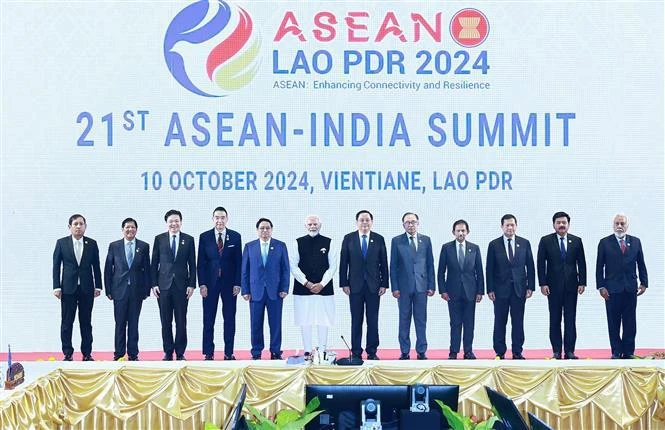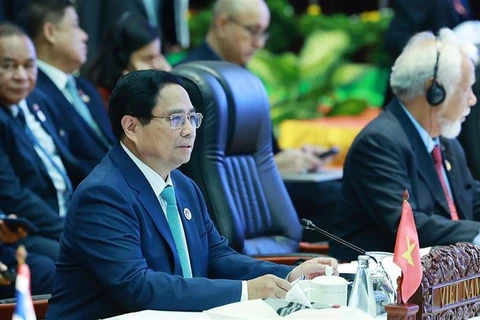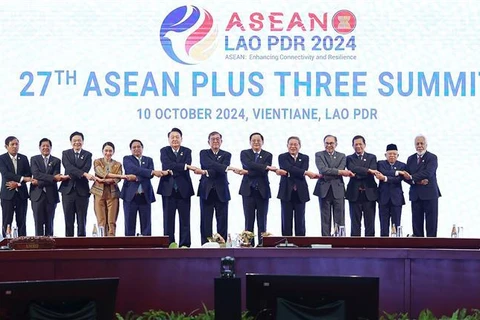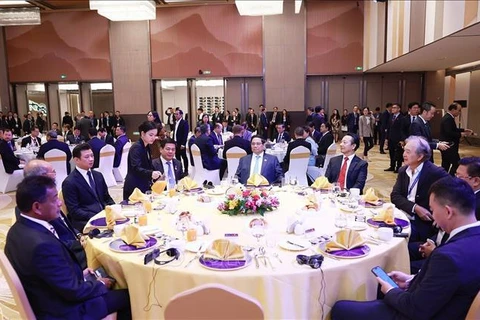
Vientiane (VNA) – Vietnamese Prime Minister Pham Minh Chinh attended the 21st ASEAN - India Summit and the ASEAN - Canada Special Summit in Vientiane, Laos, on October 10.
At the 21st ASEAN - India Summit, leaders of ASEAN countries spoke highly of India’s commitment to putting the bloc at the centre of its Act East policy and Indo-Pacific Oceans’ Initiative (IPOI), which has actively contributed to the comprehensive development of the bilateral ties.
On the basis of the ASEAN - India Comprehensive Strategic Partnership, the two sides agreed to promote cooperation in people-centred development, connectivity, sci-tech application, and digital transformation while expanding collaboration in energy transition, climate change response, blue economy, terrorism and transnational crime combat, and healthcare capacity improvement.
They also pledged to maintain dialogue, foster cooperation and organise maritime exercises to guarantee security.
In his remarks, PM Chinh called on ASEAN and India to continue nurturing the common foundation on culture, society, and people to develop the bilateral relations in an increasingly strong and comprehensive manner.
With the solid and long-standing common foundation, ASEAN wishes to join hands with India, a close neighbour, sincere friend and comprehensively trustworthy partner, to actively contribute to peace, stability, and cooperation for prosperous and sustainable development in each side, as well as the region and the world at large, he noted.
Stressing the ASEAN - India Comprehensive Strategic Partnership should share a long-term joint vision on a region and world of peace, cooperation, and development, he asked both sides to step up dialogue, cooperation and trust building, peacefully resolve disputes, cope with common challenges, shape an open and inclusive regional architecture, and uphold international law.
The Vietnamese leader hailed and voiced support for India’s initiatives such as the International Solar Alliance, the Global Biofuels Alliance, and the Coalition for Disaster Resilient Infrastructure. He also asked India to help with developing the pharmaceuticals indutry.
PM Chinh recommended joint actions to be strongly enhanced to develop the dynamic, effective and substantive relations. He emphasised that ASEAN and India need to make breakthrough progress in economic, trade, and investment ties, bring into play complementary advantages, and further open their markets to each other.
He also asked for expanding partnerships in science, technology, and innovation, particularly in such fields as core technology, semiconductor, digital economy, and training of high-quality human resources related to cloud computing, Internet of Things, and artificial intelligence.
Aside from boosting coordination to contribute to common efforts in climate change response and energy transition, the PM suggested India continue cooperation and assistance for the effective implementation of the Mekong - Ganga cooperation framework, thus helping foster inclusive growth and even and sustainable development across the region.
Concluding the summit, participating leaders adopted a statement on enhancing the ASEAN - India Comprehensive Strategic Partnership for regional peace, stability and prosperity, along with a joint statement on promoting digital transformation.

At the ASEAN-Canada Special Summit on Enhancing ASEAN Connectivity and Resilience, ASEAN and Canadian leaders welcomed the positive progress in ASEAN-Canada relations and cooperation since the two sides upgraded their relationship to a Strategic partnership in 2023.
Specifically, the implementation of the ASEAN-Canada Plan of Action for the 2021-2025 period has completed 94.17%. ASEAN is currently Canada's fourth largest trading partner. In 2023, two-way trade turnover reached 20.35 billion USD, and total FDI from Canada into ASEAN reached 3.39 billion USD.
Emphasising ASEAN's central and important position in Canada's Indo-Pacific Strategy, Canadian PM Justin Trudeau affirmed his determination to work with ASEAN to complete negotiations on the ASEAN-Canada Free Trade Agreement in 2025, bringing practical benefits and prosperity to the people.
At the same time, Canada will continue to effectively implement its cooperation commitments and priorities, such as the 24- million-CAD Canadian Trade Gateway initiative in Southeast Asia, and effectively disburse the 1-million-CAD ASEAN-Canada Trust Fund for bilateral cooperation programmes and projects.
Leaders of the countries also agreed to continue to coordinate closely, effectively exploit the remaining huge potential for cooperation, develop the ASEAN-Canada relations to match with their Strategic Partnership, support businesses, digital transformation, food security, health care, education, human resource training, people-to-people exchanges, environment, climate change response, natural disaster management and connectivity, and narrow the development gap.
ASEAN expects Canada, as the Chair of G7 in 2025 and an important member of G20, will contribute more responsibly to peace, stability and development in the region, including the East Sea, and support the shaping of a regional structure for peace, stability, cooperation and sustainable development, beneficial to both sides.
Speaking at the summit, PM Chinh shared the significance of upgrading the ASEAN-Canada relations to the Strategic Partnership in 2023, which opened a new era with opportunities for the bilateral relations. He also proposed three orientations to develop the practical, effective and mutually beneficial relationship.
ASEAN and Canada need to prioritise enhancing trade and investment connectivity, complete negotiations on the ASEAN-Canada Free Trade Agreement in 2025 as well as effectively utilising the Comprehensive and Progressive Agreement for Trans-Pacific Partnership (CPTPP), PM Chinh said.
He emphasised the priority of connecting people, expanding cooperation in education and training, supporting ASEAN in developing high-quality human resources, and providing more scholarships for students and postgraduates from ASEAN countries to study and research in Canada.
To develop a stronger ASEAN-Canada Strategic Partnership, the PM suggested Canada step up cooperation to improve resilience to climate change challenges, support ASEAN countries, especially the Mekong sub-region, in energy transition, environmental protection, natural disaster management, climate change response, emissions reduction, and sustainable development.
In addition, Canada should also participate in supporting ASEAN to further promote the development of digital economy, green economy, circular economy, and cybersecurity.
At the end of the summit, the leaders of ASEAN countries and Canada agreed to adopt a Joint Statement on Enhancing ASEAN Connectivity and Resilience./.






















